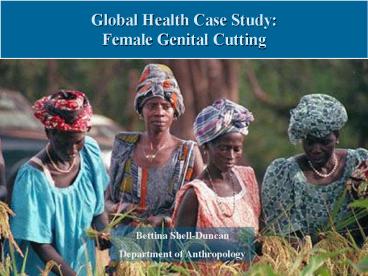P1253037218Sqibz - PowerPoint PPT Presentation
1 / 30
Title:
P1253037218Sqibz
Description:
To understand terminology and classification of types of female ... Marriageability. Western forms of Body Modification. Male circumcision. Breast Enhancement ... – PowerPoint PPT presentation
Number of Views:34
Avg rating:3.0/5.0
Title: P1253037218Sqibz
1
Global Health Case Study Female Genital Cutting
Bettina Shell-Duncan Department of Anthropology
2
Day 1
- Introduction to the Topic
3
Types of Female Circumcison
- Clitoridectomy (sunna, Type I)
- Excision (Type II)
- Infibulation (Pharaonic circumcision, Type III)
- Intermediate circumcision (matwasat, Type III)
- Introcision (hymenectomy, zur-zur cuts, gishiri
cuts, Type IV) - symbolic circumcision (Type IV)
4
African countries in which FGC has been reported
since 1979.
5
Global Campaign to Elimimate FGC
- Colonial government and missionary campaigns
- Conferences honoring the United Nations Decade
for Women (1975-85)
6
Learning Objectives
- To understand terminology and classification of
types of female circumcision - To understand origins and distribution of the
practice - To be familiar with broadly stated reasons for
the practice - To understand the political climate fueling
international opposition to female circumcision
7
Day 2
- Evidence Female Genital Cutting as a Health
Issue - What are the Medical Facts?
8
Short-Term Complications
- hemorrhage
- severe pain
- local and systemic infection
- shock
- keloid scars
- urinary retention
9
Long-term Complications
- difficulties with menstruation and urination
- urinary tract infection
- pelvic inflammatory disease
- infertility
- dermoid cysts
- neuroma
- diminished sexual pleasure
- Higher risk of STDs and HIV/AIDS
10
Obstetrical Complications
- Obstructed labor
- Hemorrhage
- Vesico-vaginal and Recto-vaginal fistulae
11
Learning Objectives
- To review findings from survey data, and
understand shortcomings of survey approaches to
understanding health outcomes of FGC - To review clinic and case studies of FGC, and
discuss the limitations of information derived
from these studies - To understand how findings on health consequences
are interpreted and employed in intervention
programs and in arguments used to justify or
condemn intervention
12
Day 3
- Why Is FGC a Priority?
13
Relative Ranking by Physicians of the Importance
of FGC as a Health Problem in Nigeria
Responses to the statement FGC is as important as Percent Agreeing
Maternal mortality 0
Diarrheal diseases 0
Malnutrition 0
Hypertension 25
Alheimers disease 75
14
Genital mutilation should be treated as a public
health problem and recognized as an impediment to
development that can be prevented and eradicated
much like any disease.
-Fran Hosken, 1978151
15
Medicalization Approaches
- provision clean razors, prophylactic antibiotics,
and anti-tetanus injections - training programs for circumcisers and TBAs
- have FGC performed by trained medical
professionals in clinics or hospitals
16
1982 Statement from the World Health
Organization WHO has consistently and
unequivocally advised that female circumcision
should not be practiced by any health
professionals in any setting - including
hospitals and other health establishments. Thi
s position has been joined by many other
organizations, including Unicef the
International Federation of Gyn. and
Obstetrics the American Medical Association
17
Tostan
- Public declarations to abandon FGC
- First declarations among 10 intermarrying
villages in 1997 - Emanated from a basic education program
18
Learning Objectives
- To outline arguments for opposing medicalization
of FGC, and to critically review evidence
supporting or refuting these arguments - To outline principles of harm reduction, and
assess how they do or do not fit with efforts to
medicalize FGC - To discuss the merits and drawbacks of including
FGC in broader integrated programs addressing
reproductive health and other community needs
19
Day 4
- Cultural Meaning and Insider Perspectives
20
Reasons for the Practice
- Control of female sexuality
- Enhance fertility
- Female gender identity
- Ethnic identity
- Religion
- Marriageability
21
Western forms of Body Modification
- Male circumcision
- Breast Enhancement
- Female Genital Cosmetic Surgeries
- designer vaginas
- www.altermd.com
22
Learning Objectives
- To discuss insider perspectives on the cultural
value and meaning of FGC - To compare FGC to other forms of body
modification found in Western societies - To discuss the ethics of condoning procedures
such as male circumcision and female genital
plastic surgeries, but opposing and outlawing
FGC.
23
Day 5
- Recasting FGC as a Human Rights Issue Cultural
Imperialism or Protection of Womens Rights?
24
Who, if anyone, has the moral authority to
condemn this practice?
- Cultural Relativism there are no value
judgements that are objectively falsifiable
independent of specific cultures, and as such,
moral judgements and social institutions are
exempt from legitimate criticims by outsiders - Universalist Stance certain individual rights
are so fundamental to humankind that they are
upheld as universal human rights
25
Human Rights Approach
- 1) Rights of the child
- 2) Rights of women
- 3) Freedom from torture
- 4) The right to health and bodily integrity
26
Learning Objectives
- To understand principles of the
universalist/cultural relativist debate, and to
discuss how FGC features as a test case in this
debate - To understand historical changes in the concept
of human rights that have allowed FGC to become
classified as a human rights violation - To understand strengths and shortcomings of
doctrinist approaches to framing FGC as a human
rights violation
27
Day 6
- Legislative Approaches and Asylum
- National and Transnational Concerns
28
Effects of National Legislation
- Deterrence
- Backlash
- Underground
- Enforcability
29
Asylum in the U.S.
- Kassindja
- Abankwah
- 9th Circuit Court of Appeals Ruling
30
Learning Objectives
- To understand the context and consequences of
enacting legislation that specifically bans FGC - To discuss the role and responsibility of foreign
governments in protecting African women from FGC































